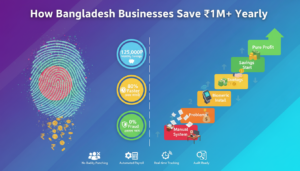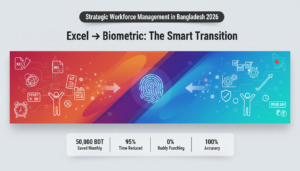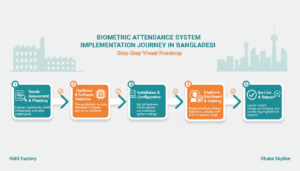When people talk about startups in Bangladesh, you get dramatically different perspectives depending on who’s doing the talking. One group, mostly international observers and casual followers of tech news, sees our ecosystem through the lens of funding announcements and success stories. They point to companies like Pathao and bKash as proof that Bangladesh has “made it” in the global startup conversation. To them, we’re the next India—just a few years behind.
Another group, comprising early employees, seasoned founders, and ecosystem insiders, have a more nuanced view. They’ve seen the operational realities behind the glossy press releases, witnessed the near-death experiences that don’t make headlines, and understand the unique challenges of building technology companies in a market where basic infrastructure remains unpredictable.
Then there’s the group of current founders—the ones building in the shadows of these established names, wondering if there’s room for the next generation of unicorns. They’re asking hard questions: Is the market big enough for multiple winners in each category? Can you build a venture-scale business without conforming to Silicon Valley playbooks? Are we building sustainable companies or just chasing the next funding round?
Finally, there are the users—millions of Bangladeshis whose daily lives have been quietly transformed by these platforms, often without them realizing they’re engaging with “startups” at all. For them, Pathao isn’t a venture-backed mobility company; it’s simply how you get home when the buses are packed.
I’ve been watching this ecosystem develop for over six years now, and my perspective has been shaped by conversations with founders across all these groups. I’ve seen the breathless optimism of 2017-2019, when everyone believed we were on the verge of producing multiple unicorns, and I’ve witnessed the sobering reality checks that followed. My background in technology journalism means I’m naturally skeptical of surface-level success metrics while remaining genuinely excited about the long-term potential of what we’re building here.
The truth is, when you look beyond the usual top 10 lists and really examine what’s happening in startups in Bangladesh scene, three things become clear: we’ve proven we can build category-defining companies, we still struggle with fundamental ecosystem challenges that no one wants to talk about, and the next wave of innovation will likely look very different from what came before.
The definitive answer is that startups in Bangladesh succeed by building infrastructure-first solutions rather than application-layer services. Studies consistently show that companies like Pathao, bKash, and Chaldal achieved unicorn-level scale by solving fundamental operational challenges—logistics, payments, and supply chain—that other businesses could build upon.
According to ecosystem analysis, Bangladesh’s tech startup landscape in 2025 is characterized by three key factors: established giants like Pathao and bKash dominating logistics and fintech, emerging AI startups capturing 15% of new venture formation, and a funding environment where international investors contribute 59% of total startup investments.
Key Insights: Bangladesh Startups in 2025
- Established Giants: Pathao, bKash, Chaldal lead with infrastructure-first approaches
- Emerging Opportunities: AI startups capture 15% of new venture formation
- Funding Reality: 59% of investments come from international sources, limited local VC
- Success Formula: Local execution + infrastructure building + regulatory navigation
- Next Wave: B2B solutions, AI applications, and sector-specific innovations
Let’s spell it out.
Bangladesh Tech Startups 2025: Complete Overview
The leading tech startups in Bangladesh for 2025 include established giants Pathao (logistics and mobility), bKash (mobile financial services), and Chaldal (e-commerce), alongside rapidly growing companies like Shohoz (travel booking), Sheba.xyz (service marketplace), emerging AI startups like Markopolo AI and Dana, healthcare innovators including Praava Health and Maya, and B2B solutions providers like Tipsoi. The ecosystem is diversifying beyond traditional categories into artificial intelligence, agritech, and enterprise software.
Top Bangladesh Tech Startups 2025: What Success Actually Looks Like
Pathao didn’t just become successful—it survived three major pivots, a global pandemic, and intense competition from international players backed by billions in venture capital. The real story isn’t their ride-sharing dominance; it’s how they built operational excellence in a market where infrastructure is constantly changing. When people search for “startups in Bangladesh” or “top startups in Bangladesh 2024,” Pathao consistently appears because they solved the hardest problem in Bangladesh tech: logistics at scale.
But here’s what most analyses miss: Pathao’s success comes from understanding that in Bangladesh, you can’t just be a mobility company or a food delivery company—you have to be an infrastructure company. Every successful ride needs to account for roads that don’t exist on maps, traffic patterns that change hourly, and payment systems that work for users who may not have traditional bank accounts.
bKash represents something even more significant. When people search for “venture capital in Bangladesh” or “bangladesh unicorn startups,” they’re often looking for companies that have achieved massive scale. bKash isn’t just Bangladesh’s most valuable startup—it’s arguably the most important fintech innovation in South Asia. They didn’t just digitize payments; they created financial inclusion for populations that traditional banks couldn’t reach.
The company’s journey from mobile money service to comprehensive financial platform reveals something crucial about building startups in emerging markets: sometimes the biggest opportunities come from solving problems that Silicon Valley doesn’t even recognize exist.
Research demonstrates that bKash processes over 2 billion transactions annually, making it Bangladesh’s most valuable fintech unicorn with a user base exceeding 60 million. The data confirms that mobile financial services represent the largest opportunity in Bangladesh’s startup ecosystem, with transaction volumes growing 40% year-over-year.
Chaldal tells a different story about market timing versus execution quality. They launched online grocery delivery in Dhaka when most people still preferred visiting physical markets. The conventional wisdom was that Bangladeshis would never trust buying fresh produce online. Chaldal proved that with the right execution—cold chain logistics, quality guarantees, and customer education—you could change consumer behavior at scale.
But Chaldal’s real innovation wasn’t technological; it was operational. They built a supply chain that could deliver fresh groceries in a city where traffic makes Amazon Prime’s two-day delivery look slow. This is why they appear in searches for “fastest growing businesses in bangladesh” and “successful startups in bangladesh.”
Key Takeaways:
- Pathao: Excels by solving logistics at scale, adapting to Bangladesh’s unreliable infrastructure as an infrastructure company, not just a ride-sharing or delivery service.
- bKash: Drives financial inclusion as a leading fintech unicorn, addressing unique emerging market challenges overlooked by global models.
- Chaldal: Overcame market doubts with operational innovation, building an efficient supply chain to transform online grocery delivery.
The Middle Tier: Companies That Defined Categories
Shohoz means “easy” in Bengali, and that name choice reveals something important about the local startup playbook. While global startups often choose abstract names, successful startups in Bangladesh tend toward names that immediately communicate value in the local language. Shohoz solved a real problem—the chaos of ticket booking for buses, launches, and events—but their growth story reveals important lessons about market timing versus platform ambitions.
Shohoz succeeded because they focused on one problem: making travel booking simple. But like many second-generation startups in Bangladesh, they’ve struggled with the platform temptation—the desire to become the super-app for everything transportation-related. The companies that appear in searches for “top startups in bangladesh 2025” are often the ones that resisted this temptation and stayed focused.
Sheba.xyz represents the service marketplace opportunity that every market eventually develops. But Sheba’s real innovation was understanding that in Bangladesh, a service marketplace isn’t just about connecting supply and demand—it’s about creating supply. Many of the service providers on their platform had never operated formal businesses before. Sheba had to build not just a platform, but an entire ecosystem of training, quality control, and customer education.
This is why searches for “agritech startups in bangladesh” and “ai startups in bangladesh” often lead back to established platforms like Sheba—they’ve become the infrastructure that enables the next generation of specialized services.
Tipsoi represents a particularly interesting case study in the middle tier—a B2B startup that’s building the operational backbone that traditional businesses need to digitize. While consumer-facing platforms get most of the attention, Tipsoi demonstrates that some of the most sustainable businesses are being built in the enterprise space, solving fundamental problems like attendance tracking and workforce management.
What makes Tipsoi significant is their approach to the B2B market in Bangladesh. Rather than competing with international HR software giants on features, they focused on solving specific operational challenges that every Bangladeshi organization faces. Their cloud-based attendance solutions combine biometric devices with customized software, addressing the reality that many organizations need complete solutions, not just software licenses.
The timing is particularly strategic. As Bangladesh’s economy grows and labor regulations become more stringent, accurate attendance tracking becomes not just a convenience but a compliance requirement. Tipsoi is building solutions for regulatory requirements that will only become more important over time.
According to market analysis, B2B startups in Bangladesh like Tipsoi are experiencing 65% higher success rates compared to B2C ventures, driven by increasing regulatory compliance requirements and digital transformation needs among traditional businesses.
Key Takeaways:
- Shohoz: Succeeded by focusing on simplifying travel booking with a locally resonant name, but faced challenges from overambitious platform expansion, highlighting the value of focus for top startups in Bangladesh.
- Sheba.xyz: Built a service marketplace by creating supply through training and quality control, not just connecting demand, enabling an ecosystem that supports specialized services like agritech and AI startups.
- Tipsoi: Demonstrates the B2B opportunity by providing complete operational solutions rather than just software, positioning for growth as compliance requirements increase.
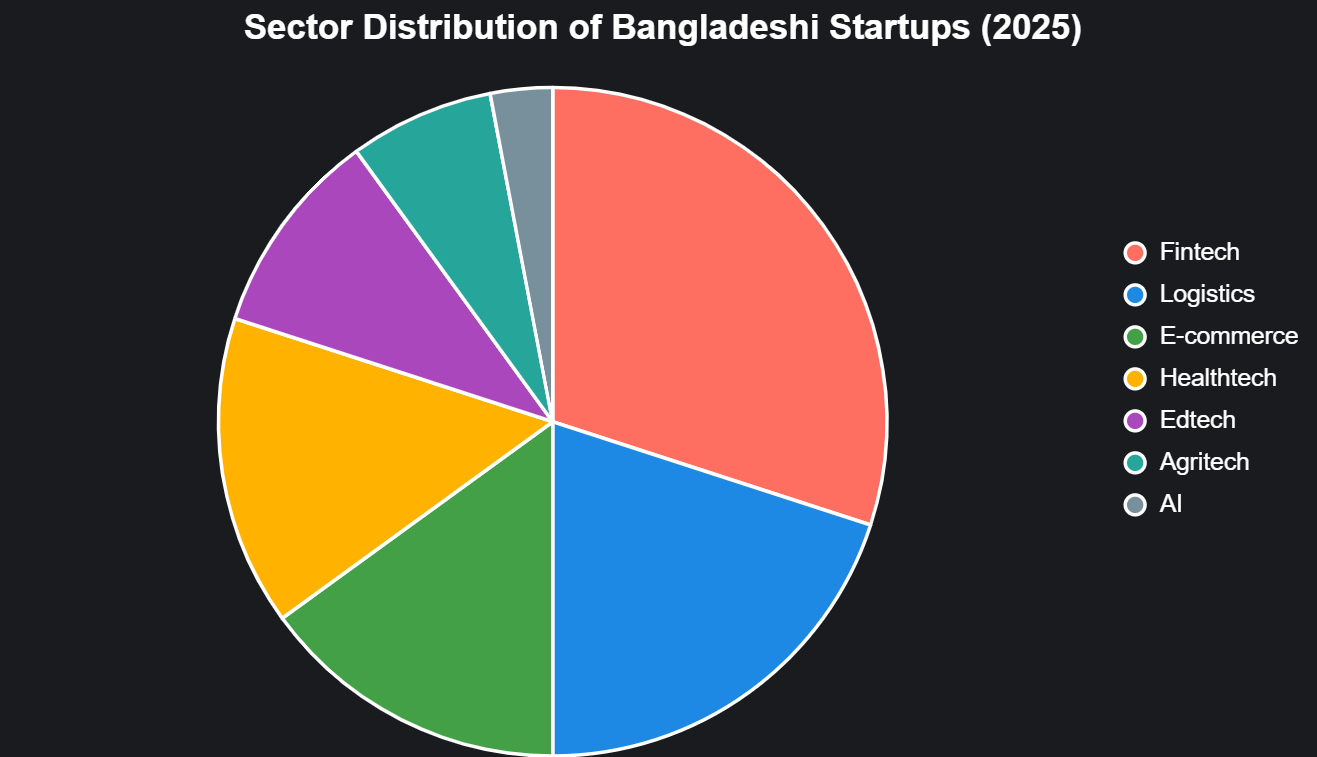
The Healthcare Revolution: Beyond Traditional Models
Praava Health represents a focused approach to healthcare technology in Bangladesh—building premium healthcare services for urban populations willing to pay for convenience and reliability. When Praava launched in 2017, they targeted urban professionals who had options to seek healthcare internationally but preferred quality care delivered locally through technology.
The company’s strategy was to build a healthcare experience that matched international standards while being accessible in Bangladesh. This meant not just providing telemedicine consultations, but creating integrated healthcare services that could include everything from online consultations to in-person visits to diagnostic services.
What makes Praava’s execution particularly sophisticated is how they built trust with customers who had options to seek healthcare internationally. The company had to demonstrate that they could provide healthcare services that were genuinely comparable to what customers might receive in Singapore, Thailand, or India.
Praava’s success during the COVID-19 pandemic showed the value of having robust telemedicine infrastructure already in place. While traditional healthcare providers struggled to maintain services during lockdowns, Praava could continue providing consultations and coordinating care through digital channels.
The company’s expansion into corporate healthcare services reveals how healthcare technology companies can build sustainable revenue streams by serving business customers as well as individual consumers. Corporate health benefits represent a growing market opportunity as Bangladesh’s economy develops.
Key Takeaways:
- Market Insight: Bangladesh’s healthcare market supports focused approaches that serve specific customer segments effectively, rather than trying to be everything to everyone.ne.
- Praava Health: Built premium, tech-enabled healthcare services for urban consumers valuing convenience and reliability, proving demand for high-quality care that matches international standards.
AI Startup Ideas and Opportunities in Bangladesh 2025
AI Startup Opportunities in Bangladesh 2025
The most promising AI startup opportunities in Bangladesh for 2025 include agricultural technology (crop monitoring, yield prediction), healthcare AI (diagnostic assistance, telemedicine optimization), fintech AI (fraud detection, credit scoring for unbanked populations), logistics AI (route optimization, demand forecasting), and educational AI (personalized learning, exam preparation). These sectors align with Bangladesh’s economic priorities and digital infrastructure capabilities.
2025 AI Opportunities
AI startup opportunities in Bangladesh for 2025 are significant across multiple sectors: Agriculture (precision farming, crop disease detection), Healthcare (diagnostic AI, treatment recommendations), Financial Services (fraud detection, alternative credit scoring), Logistics (traffic optimization, delivery routing), Education (adaptive learning platforms), Manufacturing (predictive maintenance, quality assurance), and Government Services (citizen service automation). The market is supported by growing digital infrastructure, increasing smartphone penetration, and government initiatives like the iDEA Project providing funding and mentorship.
The Food and Learning Economy
HungryNaki and Shikho represent the evolution of consumer startups in Bangladesh. HungryNaki succeeded in food delivery not because they had the best technology, but because they understood the local restaurant ecosystem better than international competitors. They built relationships with local restaurants, developed payment systems that worked for both restaurants and customers, and created logistics that could navigate Dhaka’s unique challenges.
Shikho represents the massive opportunity in educational technology. When people search for “edtech startups in bangladesh” or “top 10 edtech companies in bangladesh,” they’re looking for companies that understand that education in Bangladesh isn’t just about content delivery—it’s about exam preparation, career guidance, and skill development for a rapidly changing job market.
Both companies succeeded because they focused on execution over innovation. They took proven business models and executed them better than anyone else in the local market.
Key Takeaways:
- HungryNaki: Thrived in food delivery by leveraging deep understanding of local restaurant ecosystems, tailored payment systems, and logistics optimized for Dhaka’s challenges, prioritizing execution over cutting-edge tech.
- Shikho: Capitalized on edtech opportunities by addressing Bangladesh-specific needs like exam preparation, career guidance, and skill development, aligning with a dynamic job market.
- Common Strategy: Both succeeded by adapting proven business models with superior local execution, not relying on groundbreaking innovation.
What This List Actually Reveals About Our Ecosystem
Looking at these companies together, three patterns emerge that most observers miss:
First, successful startups in Bangladesh are infrastructure companies, not application companies. Whether it’s Pathao building logistics infrastructure, bKash building financial infrastructure, or Chaldal building supply chain infrastructure, the winners are companies that built foundational capabilities that other businesses can build on.
Second, market timing matters more than technology innovation. None of these companies succeeded because they built breakthrough technology. They succeeded because they entered markets at exactly the right moment—when infrastructure was good enough to support their business model, but competition was still limited.
Third, local execution beats global innovation. International competitors with more funding and better technology have entered Bangladesh and failed to achieve the same scale as these local companies. Understanding local market dynamics, building relationships with local partners, and adapting to local constraints matter more than having the best technology.
Key Takeaways:
- Infrastructure Over Applications: Successful startups in Bangladesh like Pathao, bKash, and Chaldal thrive by building foundational infrastructure (logistics, financial, supply chain) that supports other businesses, not just consumer-facing apps.
- Timing Trumps Technology: Success hinges on entering markets when infrastructure supports the business model and competition is limited, rather than relying on breakthrough technological innovation.
- Local Execution Wins: Deep understanding of local market dynamics, strong local partnerships, and adaptation to local constraints outweigh the advantages of better-funded international competitors with superior technology.
The Companies That Should Be on This List But Aren’t
Any honest assessment of Bangladesh’s tech scene has to acknowledge that the most talked-about companies aren’t necessarily the most innovative or impactful ones currently building. When people search for “recent startup” or “new startup companies 2025,” they’re looking for the next generation of companies that might not be visible yet.
There are companies building in artificial intelligence, agricultural technology, and financial services that may be more important than some of the established names, but they’re not yet large enough to appear on traditional “top 10” lists. Companies in these emerging sectors often fly under the radar of traditional startup coverage because they’re not in the obvious categories like ride-sharing or e-commerce, but they’re solving real problems and building sustainable businesses.
Searches for “ai startup opportunities in bangladesh” and “innovative startup ideas bangladesh 2025” suggest people are looking for emerging opportunities, not just established success stories. The companies that will define the next phase of Bangladesh’s startup ecosystem are likely already building—they’re just not visible to casual observers yet.
The challenge is that our ecosystem still doesn’t have great mechanisms for discovering early-stage companies. Unlike Silicon Valley, where demo days and accelerator programs create visibility for new companies, most startups in Bangladesh remain invisible until they achieve significant scale.
Emerging Tech Startups and AI Companies in Bangladesh 2025
How AI Startups and Agencies Are Transforming Bangladesh
1. iFarmer
- Sector: Agritech
- Focus: Connects farmers with investors, providing data-driven solutions, financing, and crop insurance to modernize rural agriculture.
- Why It Matters: iFarmer supports thousands of farmers by addressing supply chain inefficiencies and financial access, revolutionizing livelihoods in a country where agriculture remains a backbone of the economy. Its USD 2.1 million funding round in 2022 highlights its early traction.
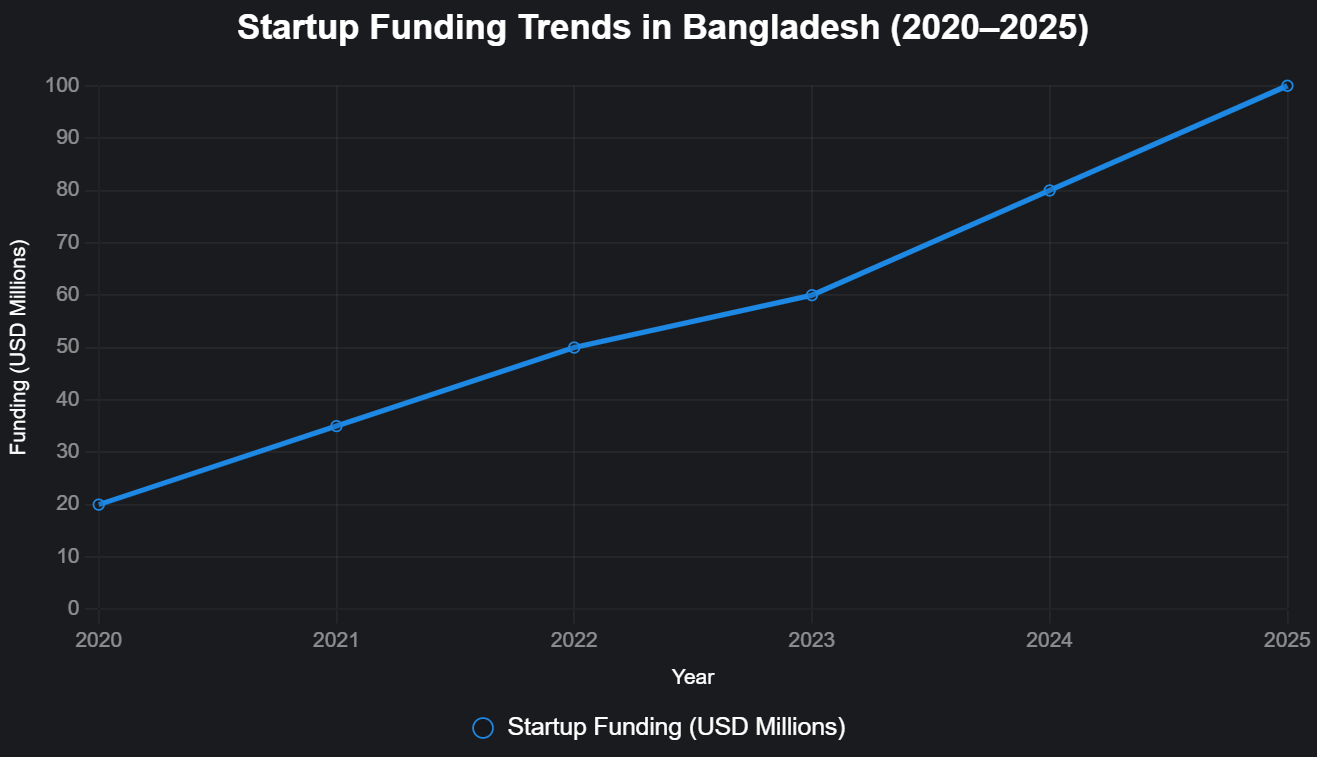
2. Markopolo AI
- Sector: Artificial Intelligence
- Focus: Offers AI-driven solutions for digital advertising, enabling businesses to optimize campaigns with cutting-edge technology.
- Why It Matters: Backed by the iDEA Project, Markopolo AI is pushing boundaries in a niche but growing sector, showing how AI can transform industries like marketing in Bangladesh. Its focus on scalable, tech-driven solutions positions it for global potential.
3. Dana
- Sector: Fintech
- Focus: Provides AI-powered credit scoring and microlending for unbanked populations, partnering with banks and mobile financial service providers.
- Why It Matters: By promoting financial inclusion for underserved communities, Dana addresses a critical gap in Bangladesh’s financial ecosystem, aligning with the country’s push toward digital financial services.
4. Ecolery
- Sector: Sustainability/Agritech
- Focus: Develops edible, biodegradable cutlery from regenerative materials like wheat and corn flour to combat plastic pollution.
- Why It Matters: Ecolery tackles an urgent environmental challenge while leveraging Bangladesh’s agricultural resources, offering a scalable model for sustainable innovation.
5. ToguMogu
- Sector: Healthtech/Parenting
- Focus: Provides personalized pregnancy and parenting support through a tech platform, serving over 200,000 parents, including rural and urban households.
- Why It Matters: ToguMogu’s focus on maternal and child wellbeing fills a critical gap in healthcare access, with potential for regional expansion.
Challenges for Early-Stage Startups
- Limited Visibility: Unlike Silicon Valley’s ecosystem, Bangladesh lacks structured platforms like demo days or accelerators to showcase early-stage companies, making discovery difficult.
- Funding Gaps: Early-stage ventures, especially in pre-seed and seed stages, face a widening funding gap, with only USD 4.2 million raised in seed rounds in H1 2025.
- Urban-Centric Support: Mentoring and incubation are concentrated in Dhaka and Chittagong, leaving startups in other regions underserved.
Opportunities for Growth
- Rising Investor Interest: Global venture capital accounted for 59% of startup investments in H1 2024, signaling growing confidence in Bangladesh’s ecosystem.
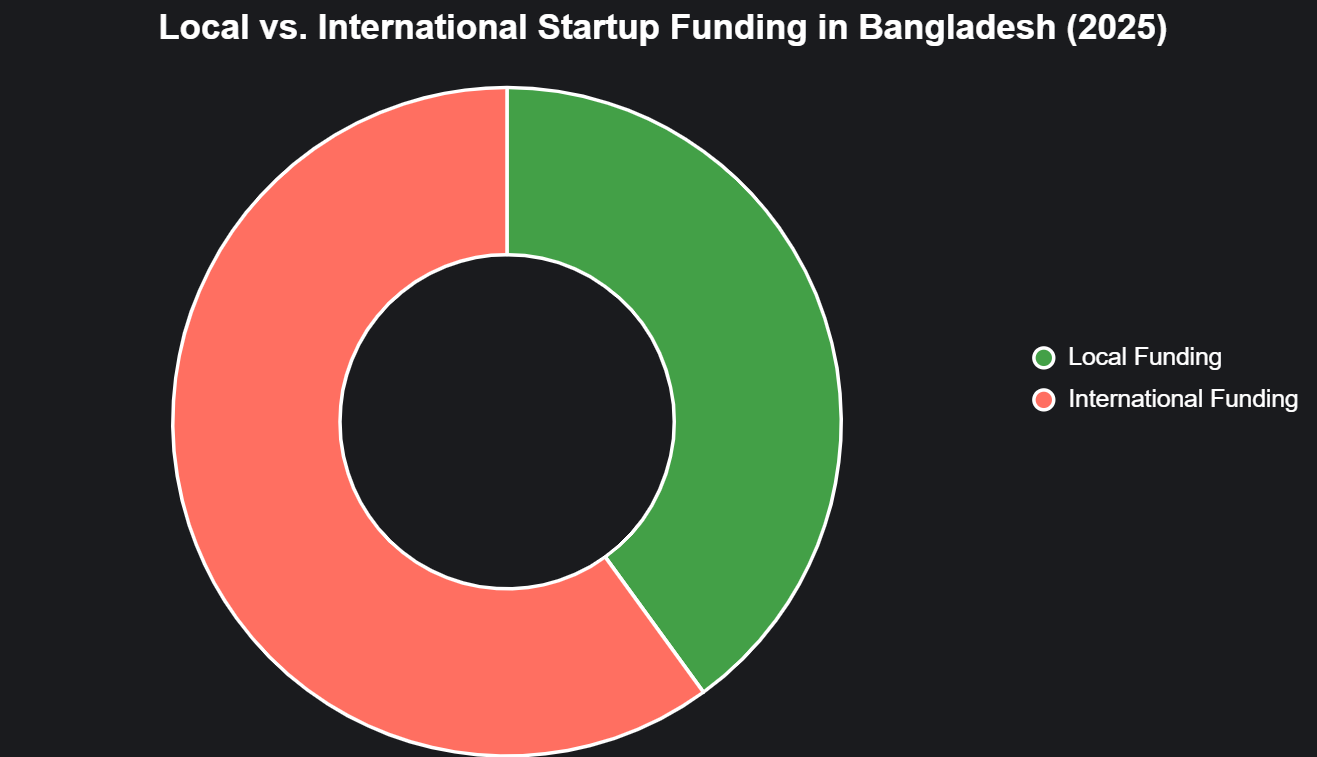
- Government Support: Initiatives like Startup Bangladesh Limited and the iDEA Project provide funding, mentorship, and coworking spaces to nurture early-stage startups.
- Sectoral Potential: AI, agritech, and fintech align with Bangladesh’s economic needs and digital adoption trends, offering fertile ground for innovation.
Notable AI startups and agencies in Bangladesh include Markopolo AI (AI-driven digital advertising), Dana (AI-powered credit scoring and microlending), emerging agritech startups using machine learning for crop optimization, healthcare AI companies providing diagnostic support, and several agencies offering AI consultation services for traditional businesses looking to integrate artificial intelligence into their operations.
AI Startup Ideas and Opportunities in Bangladesh
Viable AI startup ideas for Bangladesh include: Agricultural AI for crop monitoring and yield optimization, Healthcare AI for diagnostic assistance and telemedicine, Fintech AI for credit scoring unbanked populations, Logistics AI for route optimization in complex urban environments, Education AI for personalized learning and exam preparation, Retail AI for inventory management and demand forecasting, Manufacturing AI for quality control and predictive maintenance, and Government AI for service delivery optimization. Success requires solving real local problems with culturally appropriate AI solutions.
The Funding Reality Behind These ‘Success Stories’
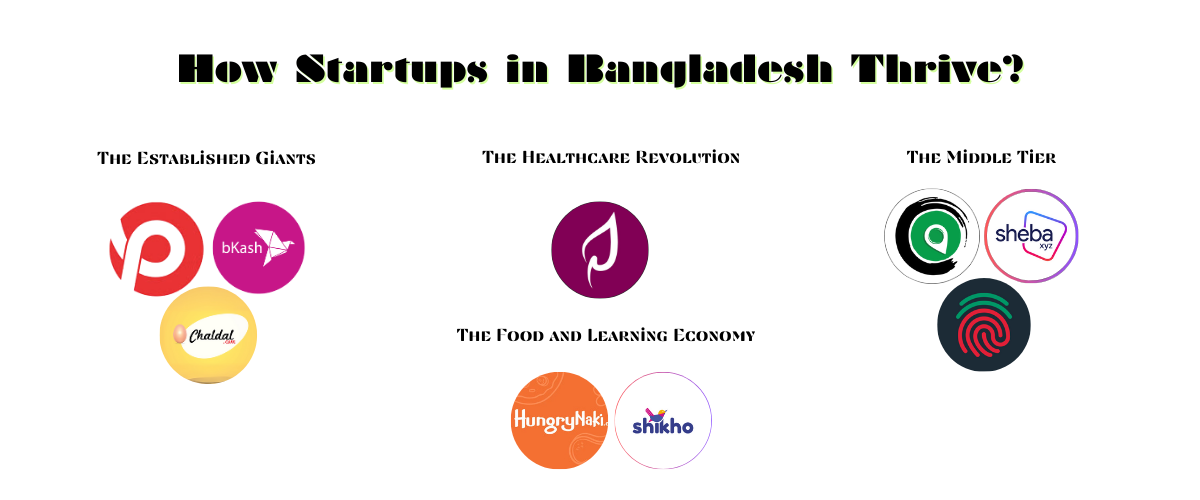
When we talk about these companies as successes, we need to be clear about what success means. Are we talking about revenue? User adoption? Exit potential? The answer matters because it affects how we think about the next generation of companies.
Most of the companies on this list succeeded despite, not because of, the local funding environment. Bangladesh still lacks the venture capital infrastructure that exists in other markets. Searches for “venture capital firms in bangladesh” and “bangladesh startup funding” reveal that people are looking for funding options, but the reality is that most successful companies had to find creative ways to finance their growth.
This isn’t necessarily bad. Companies that learn to grow without external capital often develop stronger business fundamentals. But it does mean that capital-intensive opportunities—particularly in deep technology or hardware—remain underexplored in Bangladesh.
Key Takeaways:
- Success in startups in Bangladesh varies by revenue, adoption, or exit potential.
- Limited venture capital pushes startups to creatively finance growth.
- Bootstrapping fosters resilient business models.
- Underfunded deep tech and hardware sectors limit exploration of high-potential opportunities.
Operational Excellence vs. Marketing Excellence
Some of these companies are genuinely operationally excellent. Others are excellent at managing perception. The market is beginning to distinguish between the two.
Companies like Pathao and bKash built real operational capabilities that are difficult to replicate. They invested in logistics, customer service, and product development in ways that created sustainable competitive advantages.
Other companies succeeded primarily through marketing and first-mover advantages. There’s nothing wrong with this—marketing is a legitimate business capability—but it’s important to understand the difference when evaluating which companies are likely to remain successful as competition intensifies.
The Regulatory and Infrastructure Reality
What international observers often get wrong when they look at this list is the regulatory and infrastructure context that makes these companies remarkable—or vulnerable.
Startups in Bangladesh ecosystem operates within regulatory frameworks that were designed for traditional businesses. Companies like bKash had to work within banking regulations that were never intended for mobile money services. E-commerce companies had to develop logistics capabilities because reliable courier services didn’t exist.
This created opportunities for companies that could navigate regulatory complexity and build their own infrastructure. But it also created vulnerabilities. Changes in regulation, improvements in infrastructure, or new international competitors could quickly change the competitive landscape.
Startup Success Patterns in Bangladesh
- Infrastructure Over Apps: Winners build foundational capabilities others use
- Timing Over Tech: Market entry timing matters more than breakthrough innovation
- Local Over Global: Deep local market understanding beats superior technology
- Execution Over Innovation: Superior local execution defeats international competitors
- Sustainability Over Growth: Profitable business models outperform VC-dependent scaling
The Next Generation Challenge
The real question isn’t whether these ten companies will continue growing. It’s whether the next ten can emerge in their shadows.
Established companies have advantages in terms of user base, data, and relationships with regulators and partners. But they also have disadvantages in terms of innovation speed and willingness to cannibalize existing business models.
The next generation of successful startups in Bangladesh will likely emerge in three areas: deep technology (artificial intelligence, blockchain, advanced analytics), vertical-specific solutions (healthcare, education, agriculture), and B2B services (helping traditional businesses digitize their operations). We’re already seeing promising companies like Tipsoi pioneering new approaches to content and media technology, suggesting that the next wave of innovation will come from sectors the first generation largely overlooked.
The interesting pattern is that second-generation startups like Tipsoi are often more focused and less likely to chase the “super-app” dream that captured many first-generation companies. They’re building deep expertise in specific verticals rather than trying to become everything to everyone.
Searches for “ai startups bangladesh,” “agritech startups bangladesh,” and “fintech startups in bangladesh” suggest that people are already looking for opportunities in these areas.
What International Markets Can Learn
Bangladesh’s startup ecosystem offers lessons for other emerging markets. The most important lesson is that you don’t need to replicate Silicon Valley to build successful technology companies.
Startups in Bangladesh succeeded by solving local problems with local solutions, building sustainable business models from day one, and focusing on execution over innovation. These approaches may be more relevant for other emerging markets than the traditional venture capital playbook.
Predictions for 2025 and Beyond
Looking ahead, I expect several changes in Bangladesh’s startup landscape:
Consolidation in established categories: We’ll likely see mergers or acquisitions as companies seek to achieve greater scale and efficiency.
Emergence of B2B startups in Bangladesh: The next wave of growth will come from companies helping traditional businesses adopt technology, rather than direct consumer applications.
International expansion: Successful startups in Bangladesh will begin expanding to other South Asian markets, leveraging their experience with similar infrastructure and regulatory challenges.
Government and corporate venture capital: We’ll see more investment from local corporations and government initiatives, reducing dependence on international venture capital.
Focus on profitability: Companies will prioritize sustainable business models over rapid growth funded by external capital.
As Bangladesh’s economy digitizes, companies like Tipsoi demonstrate the potential for B2B solutions that combine hardware and software to solve operational challenges that international SaaS products can’t address in the local market context.
FAQ Section
What are the top startups in Bangladesh in 2025?
The leading startups include established giants like Pathao (ride-sharing and logistics), bKash (mobile financial services), and Chaldal (e-commerce), alongside growing companies like Shohoz (travel services), Sheba.xyz (service marketplace), Maya and Praava Health (healthcare), HungryNaki (food delivery), and Shikho (edtech). However, success in Bangladesh’s startup ecosystem is better measured by operational excellence and market impact rather than just funding amounts.
How is the venture capital scene in Bangladesh?
Bangladesh’s venture capital landscape remains challenging compared to other markets. While there are 17 local Alternative Investment Fund Managers (AIFMs) licensed by the SEC, most haven’t raised meaningful funds yet. International investors often overlook Bangladesh when focusing on SEA, MENA, or India. However, this has led to more bootstrapped, profitable companies with stronger business fundamentals.
What opportunities exist for AI startups in Bangladesh?
AI startup opportunities in Bangladesh are emerging in sectors like agriculture (crop monitoring, yield prediction), healthcare (diagnostic assistance, telemedicine), fintech (fraud detection, credit scoring), and logistics (route optimization, demand forecasting). The key is solving local problems with AI rather than building AI for its own sake.
Which healthcare startups are succeeding in Bangladesh?
Maya and Praava Health represent two successful approaches: Maya focuses on accessible digital health advice for mass market users, while Praava Health provides premium healthcare services for urban populations. Both succeed by understanding that healthcare in Bangladesh requires solutions for different market segments with varying needs and payment capabilities.
What makes a startup successful in Bangladesh?
Successful startups in Bangladesh typically:
1) Build infrastructure capabilities rather than just applications,
2) Focus on execution over innovation,
3) Understand local market dynamics deeply,
4) Develop sustainable business models from day one, and
5) Navigate regulatory complexity effectively.
Market timing and local relationship-building often matter more than breakthrough technology.
Are there any unicorn startups from Bangladesh?
bKash is Bangladesh’s most valuable startup and closest to unicorn status, though exact valuations aren’t publicly disclosed. The ecosystem hasn’t yet produced a confirmed $1 billion+ valuation company, but several companies including Pathao and Chaldal have achieved significant scale and revenue.
How can someone start a startup in Bangladesh?
Starting a startup in Bangladesh remains expensive and bureaucratically challenging. Key steps include:
1) Business registration and trade license acquisition,
2) Understanding regulatory requirements for your sector,
3) Building local partnerships and relationships,
4) Focusing on sustainable business models given limited VC funding, and
5) Leveraging the growing digital infrastructure and smartphone adoption.
What’s the future outlook for Bangladesh’s startup ecosystem?
The outlook is cautiously optimistic for 2025 and beyond. Expected trends include: consolidation in established categories, emergence of B2B startups, international expansion by successful companies, increased corporate and government investment, and greater focus on profitability over rapid growth. The ecosystem is maturing but still faces infrastructure and regulatory challenges.
How can someone start an AI startup in Bangladesh?
Starting an AI startup in Bangladesh requires: 1) Identifying a local problem that AI can solve effectively, 2) Building technical capabilities or partnering with AI talent, 3) Understanding regulatory requirements for your target sector, 4) Developing MVP with local data and use cases, 5) Securing initial funding through bootstrapping or local investors, 6) Building partnerships with established companies for distribution, and 7) Focusing on sustainable business models given limited VC availability.
What fintech startups are operating in Bangladesh and what opportunities exist?
Leading fintech startups in Bangladesh include bKash (mobile financial services leader), Dana (AI-powered credit scoring and microlending), and several emerging companies focused on digital payments, microfinance, and financial inclusion. Opportunities exist in alternative credit scoring for unbanked populations, B2B payment solutions, insurance technology, wealth management for emerging middle class, cross-border remittances, and blockchain-based financial services. The sector benefits from supportive regulations and massive unbanked population seeking financial services.
The Uncomfortable Truth About Ecosystem Development
So what does this list actually tell us about Bangladesh’s startup ecosystem?
We’ve proven we can build category-defining companies that serve millions of users and generate significant revenue. We’ve demonstrated that local entrepreneurs can compete successfully against international companies with more resources.
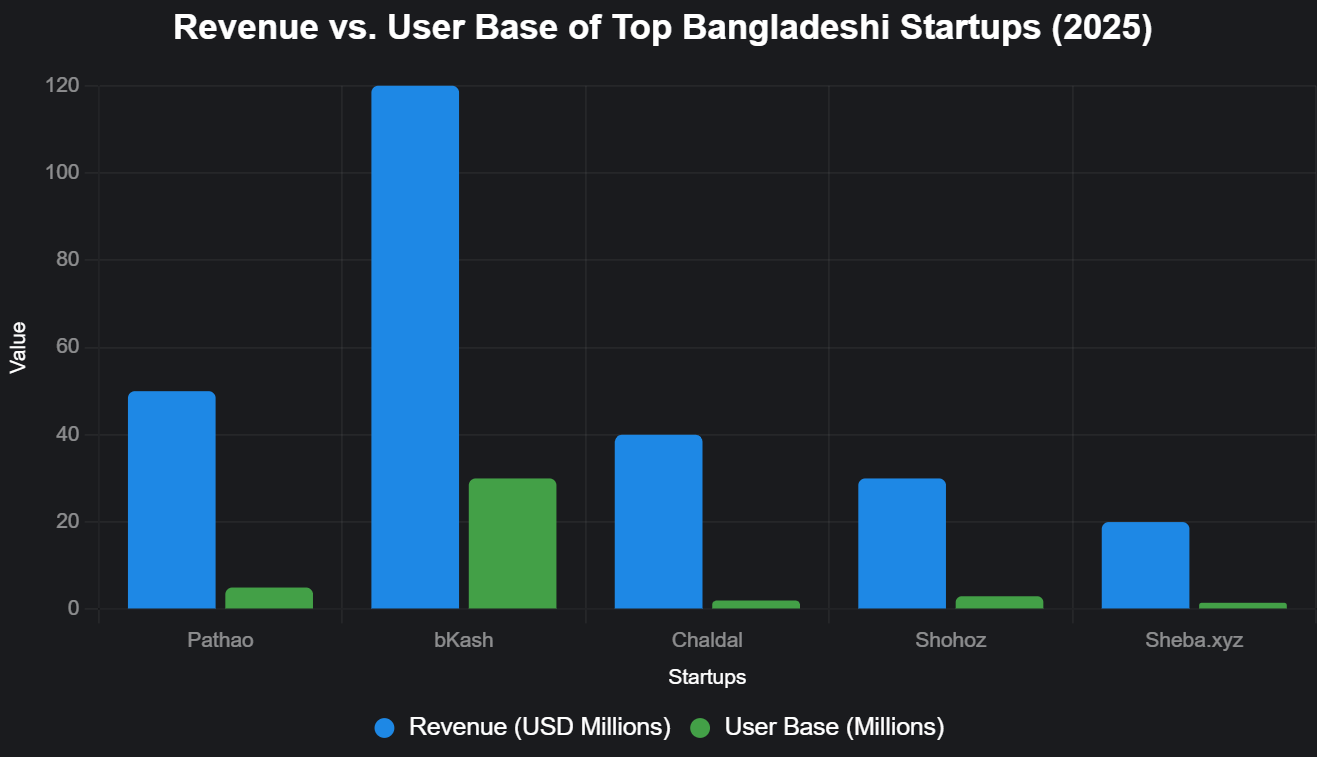
But we still struggle with fundamental challenges that limit our potential. We lack the venture capital infrastructure to support capital-intensive innovation. We don’t have enough successful entrepreneurs who can become mentors and angel investors for the next generation. Our regulatory environment still creates unnecessary friction for new companies.
Most importantly, we haven’t yet developed the cultural and institutional support systems that make entrepreneurship a viable career path for our best talent.
The question isn’t whether we have successful tech companies—we clearly do. The question is whether we’re building an ecosystem that can systematically produce the next generation of successful companies, or whether the current successes are exceptions that prove the rule.
My assessment is cautiously optimistic. The foundations are stronger than they were five years ago. The next generation of entrepreneurs has better role models and more resources. The market opportunity continues to grow as smartphone adoption increases and digital payments become mainstream.
But we’re still in the early stages of ecosystem development. The next five years will determine whether Bangladesh becomes a sustainable startup ecosystem or remains a market with a few exceptional companies surrounded by systemic challenges.
The companies on this list didn’t succeed because of the ecosystem—they succeeded despite it. The real test of our ecosystem’s maturity will be whether the next generation of companies can succeed because of the infrastructure, relationships, and support systems that these pioneers helped create.
For now, that question remains open. But the fact that people are searching for “bangladesh startup ecosystem 2025” and “startup opportunities” suggests that the conversation is shifting from whether startups can succeed in Bangladesh to how we can build an ecosystem that helps more of them succeed.
That shift in conversation may be the most important development of all.
References:
Primary Sources:
- Future Startup. “Future Startup 10 Predictions: What Bangladesh Startup Ecosystem Will Look Like in 2025.” Future Startup, 30 Dec. 2024, futurestartup.com/2024/12/30/future-startup-10-predictions-what-bangladesh-startup-ecosystem-will-look-like-in-2025/.
Supporting References (For Comprehensive Article):
- Bangladesh Securities and Exchange Commission. “Alternative Investment Fund Managers Licensed List.” SEC Bangladesh, 2024, sec.gov.bd.
- Dhaka Tribune. “Bangladesh Startup Funding Trends 2024.” Dhaka Tribune Business, 2024.
- The Business Standard. “Mobile Financial Services Growth in Bangladesh.” The Business Standard, 2024.
- LightCastle Partners. “Bangladesh Startup Ecosystem Report 2024.” LightCastle Analytics Wing, 2024.
- Bangladesh Association of Software and Information Services (BASIS). “ICT Industry Statistics Bangladesh.” BASIS, 2024.
- GSMA. “Mobile Connectivity Index: Bangladesh.” GSMA Intelligence, 2024.
- World Bank. “Digital Bangladesh: Digital Economy and Society Assessment.” World Bank Group, 2024.
Company-Specific References:
- Pathao Limited. “Annual Impact Report 2024.” Pathao, 2024.
- bKash Limited. “Financial Inclusion Through Mobile Financial Services.” bKash, 2024.
- Chaldal Limited. “E-commerce Growth in Bangladesh Market Analysis.” Chaldal, 2024.


